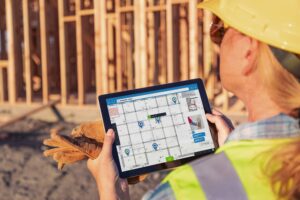Gina Siebler shares her experiences of moving into a new industry, discussing how she overcame the challenges and how she has adapted, highlighting that a lack of experience in a specific sector, doesn’t need to be a stumbling block when progressing your career.
My passion lies in the high-risk environment. I find it fascinating how these types of industries have developed in order to manage the risks they present. From MEWPs, which allow you to reach the inaccessible, to radio detection devices, which can help detect what utilities are under your feet. It’s simply amazing.
Why gas?
 When thinking about my next steps in my career, I realised my main interest was in managing hazards in high risk environments and I became intrigued by industries such as construction and railway. Before taking on my current role, I was on a maternity cover contract in social housing. It is an interesting area to work in and I had lots of exposure to a variety of areas such as residential fire safety, maintenance activity and personal safety. Having such a broad experience focused my mind and confirmed that I wanted to move where my passion was. Thus, as my contract was reaching its end, I continued to search for ways to pursue my passion.
When thinking about my next steps in my career, I realised my main interest was in managing hazards in high risk environments and I became intrigued by industries such as construction and railway. Before taking on my current role, I was on a maternity cover contract in social housing. It is an interesting area to work in and I had lots of exposure to a variety of areas such as residential fire safety, maintenance activity and personal safety. Having such a broad experience focused my mind and confirmed that I wanted to move where my passion was. Thus, as my contract was reaching its end, I continued to search for ways to pursue my passion.
Whilst reviewing opportunities available, my mentor suggested that I should also consider industries such as utilities and infrastructure. This was really valuable, as I had no experience in these areas and so hadn’t considered them as options for career progression. But with nothing to lose, I included these industries in my search and with success, as I was offered the opportunity to work within the gas industry.
How have I found my first three months?

Never having worked in gas before, nor in utilities in general, it has been exciting from day one. In the first few weeks there was so much learning. I got home at the end of each day both mentally drained and feeling like my mind was going to explode with information. I was eager to go back the next day for more. I went from getting my Energy & Utilities Skills Register (EUSR) Safety, Health and Environmental Awareness (SHEA) gas passport to learning how to write lift plans and more. Not only did I learn new things but areas I thought I understood I developed further.
But the first three months weren’t all about doing training courses, because as soon as I got my PPE, I was out! Armed with my iPad, my shiny new orange high-vis and butterflies in my stomach, I was ready! I’m not new to the health & safety industry, nor to site visits but I do get a little nervous as I was outside of my comfort zone.
During the first few audits I shadowed colleagues. They helped me familiarise myself with the audit apps used as well as the question sets and what evidence I would need to see. It was a really interesting experience to meet and see other health & safety professionals in action as on every joint visit I picked up something new. I then used the learning to develop my own methods and improve on my auditing style. Such an example is engagement visits, where you go see the team and simply engage with them informally rather than undertake a formal logged audit.
It was a fascinating initial period. I experienced a different approach to incident investigations, where the operations side leads and health & safety is simply there to advise and provide guidance. I observed teams being stood down for the day for safety talks and bacon butties, where the workforce was reminded of their role in safety, not just of their own but others around them. I even led the presentation on SHEQ performance on one of these ‘Stand down for safety days’ in my second month there! And much more.
My advice
Don’t let your fear of lack of experience stop you from taking the leap into the unknown. If you get your foot into the door, do it! These high-risk industries like gas are absolutely intriguing from a health & safety perspective. The way the industry has developed to make it safer for the workers is just fascinating. For example, in the gas industry, they use a technique called ‘electrofusion’, which is a method to join plastic pipes using electric heating. This removes the risks previously posed by metal welding.
If you are considering taking the leap, or you have already made the jump but might be struggling, then make sure you head out as much as you can. See the teams work, speak to them and keep asking questions. I previously wrote an article on introducing site visits on SHP, where I discuss the value of site visits. The same applies here. Mentoring is another way to help focus thoughts and build confidence in taking the step into a new world. There are plenty of avenues to finding someone who you connect with – your local IOSH group is a good place to start, explore your network or use LinkedIn.
My biggest advice is to just keep asking questions! Don’t be afraid to ask dumb questions, whether you are new to a role or you have been doing it for years. There is a great saying that I came across the other day: “He who asks a question is a fool for five minutes; he who does not ask a question remains a fool forever.” Not only does this support you but I’ve found it to help identify vulnerability in a system.
So don’t let anything or anyone hold you back. Take the leap, head out, see the teams and ask questions!
Safety & Health Podcast
Subscribe and tune in the Safety & Health Podcast to discover the latest issues facing the health and safety profession, and stay on-top of the developments affecting your role, from working at height, lone working and common workplace hazards, to safety culture, behaviours, occupational health and mental health and wellbeing.
In this episode, we are joined by Anna Keen, Founding Director at Acre Frameworks, who provides guidance on learning the relevant skills to progress your career and delves into confidence, including how to present yourself and tips for leaders when dealing with Imposter Syndrome.
Advance your career in health and safety
Browse hundreds of jobs in health and safety, brought to you by SHP4Jobs, and take your next steps as a consultant, health and safety officer, environmental advisor, health and wellbeing manager and more.
Or, if you’re a recruiter, post jobs and use our database to discover the most qualified candidates.

 When thinking about my next steps in my career, I realised my main interest was in managing hazards in high risk environments and I became intrigued by industries such as construction and railway. Before taking on my current role, I was on a maternity cover contract in social housing. It is an interesting area to work in and I had lots of exposure to a variety of areas such as residential fire safety, maintenance activity and personal safety. Having such a broad experience focused my mind and confirmed that I wanted to move where my passion was. Thus, as my contract was reaching its end, I continued to search for ways to pursue my passion.
When thinking about my next steps in my career, I realised my main interest was in managing hazards in high risk environments and I became intrigued by industries such as construction and railway. Before taking on my current role, I was on a maternity cover contract in social housing. It is an interesting area to work in and I had lots of exposure to a variety of areas such as residential fire safety, maintenance activity and personal safety. Having such a broad experience focused my mind and confirmed that I wanted to move where my passion was. Thus, as my contract was reaching its end, I continued to search for ways to pursue my passion.